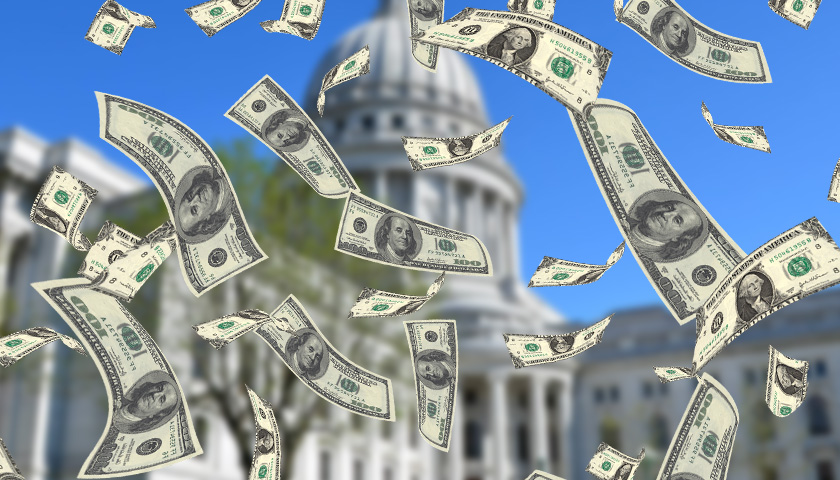As the Wisconsin Legislature considers sweeping tax cuts, a new report finds a flat tax would yield substantial benefits for all.
The report, published by the Badger Institute, notes that single-rate reform to Wisconsin’s costly progressive tax system would spur faster economic growth, creating more jobs and more investment — all while lowering the burden on Badger State taxpayers.
Arriving a day after Republican lawmakers proposed a 4.5 percent flat state income tax, the institute’s analysis found that even a 5.1 percent flat tax would reap substantial benefits. Wisconsin’s progressive tax race includes a top rate of 7.65 percent, the eighth-highest rate in the nation.
Don Bruce, the Randy and Jenny Boyd Distinguished Professor at the University of Tennessee’s Haslam College of Business, was commissioned last fall to review the numbers. Bruce, who also serves as director for the university’s Boyd Center for Business and Economic Research, has compiled similar studies estimating the effect of tax reform. His report shows such reform in Wisconsin would over the next five years:
- Increase Wisconsin’s output of goods and services by $7.2 billion
- Add 24,000 additional jobs,
- Increase business investment by $614 million.
Before tax reform, Wisconsin’s economy is forecast to grow between 2.1 percent and 3.4 percent a year. Tax reform adds more than a third of a percentage point to that rate, according to the study “The Economic Implications of a Flat-Rate Income Tax for Wisconsin.”
The researcher’s findings show that the flat tax would reduce an expected decline in employment. By the fifth year, the tax cut would spur job growth to rise by 0.35 percent rather than by the 0.19 percent now projected. That’s thousands of jobs.
“These are substantial impacts, especially in light of the slow to negative projected growth in the next two years. As such, these are lower-bound estimates that would be even larger in more robust economic times,” the researcher states in the report.
It is expected the positive economic impacts would only expand under a lower flat tax rate.
A bill introduced this week by State Representatives John Macco (R-Ledgeview) and Jerry O’Connor (R-Fond du Lac) would phase out the state’s progressive income tax until individuals making $13,810 annually and married couples earning $18,400 per year pay no income tax. The rate for all others would be 4.5 percent.The Legislative Fiscal Bureau estimates the state government would annually lose out on about $3.5 billion in tax dollars, but, as Bruce contends, the economic output could more than make up the lost revenue.
The lawmaker’s plan would be phased in over five years.
“Under this plan every Wisconsinite wins! Everyone’s taxes are reduced, and every municipality will receive additional funding in a smart and efficient way,” Macco said.
Under the bill, Wisconsin’s tax rate would drop to two brackets: 0% and 4.5%. The lawmakers estimate the average decrease would be $1,292, with tax cut reductions of nearly 60 percent for Wisconsinites making under $50,000.
The plan has competition, however. Senate Majority Leader Devin LeMahieu (R-Oostburg) has offered a 3.25 percent flat tax, effective 2026. Tax and spender Governor Tony Evers would cut taxes for some, raise taxes for others. The Democrat has threatened to kill any flat tax proposal with his veto pen.
Republicans, who hold significant majorities in the Assembly and Senate, have vowed to deliver a budget that delivers historic tax cuts, tapping into the state’s unprecedented $7.1 billion budget surplus. Evers wants to use a good portion of the tax dollars for government programs and initiatives.
Bruce, the author of the Badger Institute report, says the world has changed in recent decades. In the post-pandemic, remote-working world, employers have a lot more options.
“Both the level and location of labor supply are more responsive to taxation than ever before,” the researcher said. “While steeply progressive marginal rates might be consistent with some definitions of fairness, they also distort economic activity if taxpayers work less, save less or move around to avoid high tax burdens.”
He added policymakers must balance the need to achieve the desired degree of progressivity against the distortions to economic activity that result from taxation.
“Wisconsin’s current income tax reflects a greater weight on progressivity, at the cost of potentially greater distortions to economic activity.”
– – –
M.D. Kittle is the National Political Editor for The Star News Network.
Photo “Wisconsin State Capitol” by Vijay Kumar Koulampet. CC BY-SA 3.0.








